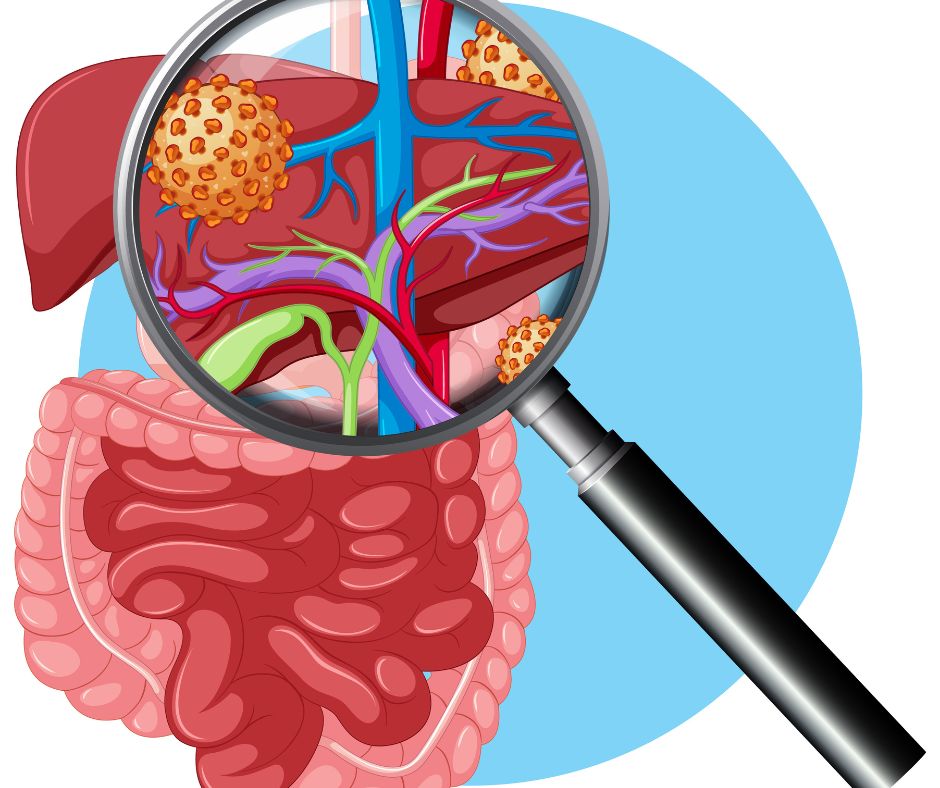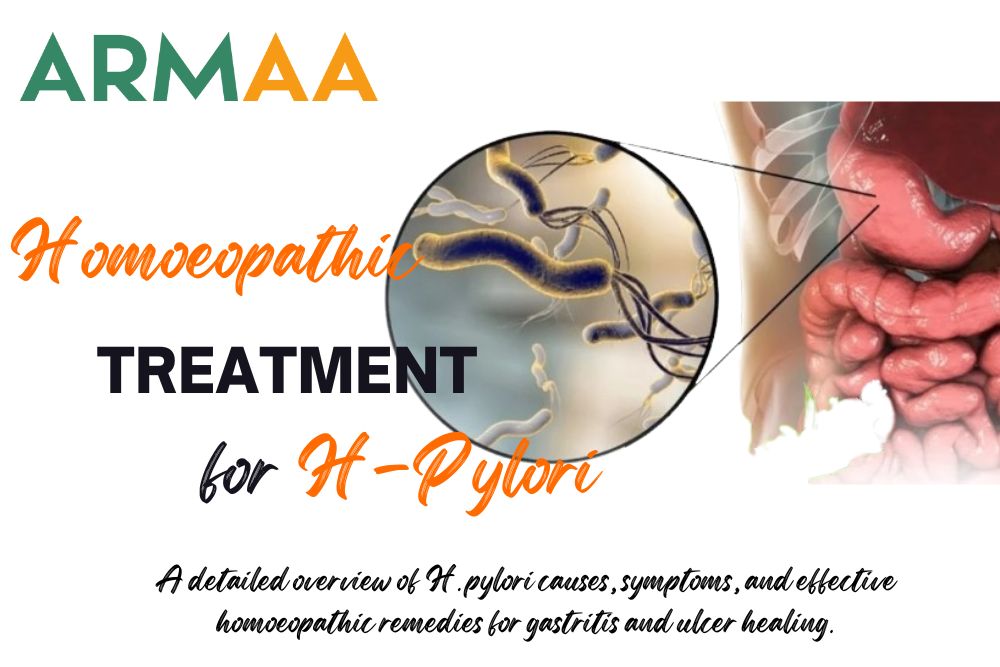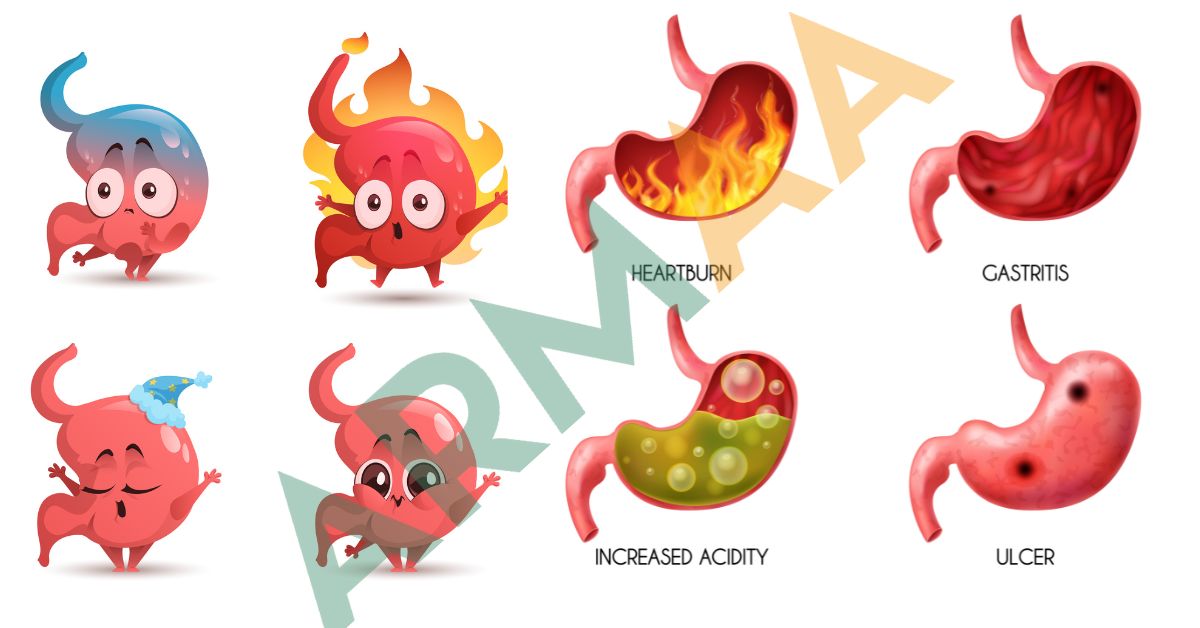Liver cirrhosis is a progressive condition characterized by the replacement of healthy liver tissue with scar tissue, leading to impaired liver function. This deterioration not only affects the liver but also has significant repercussions on the gastrointestinal (GI) system. Patients with cirrhosis often experience GI symptoms that can impact their nutritional status and overall quality of life.
جگر کا سیروسس ایک سنگین بیماری ہے جو نہ صرف جگر بلکہ پورے نظامِ انہضام کو متاثر کرتی ہے۔ اس مضمون میں ہم جگر کے سیروسس کے مریضوں میں معدے کی خرابیوں اور ان کے ممکنہ ہومیوپیتھک علاج پر روشنی ڈالیں گے۔

Key Gastrointestinal Issues in Cirrhosis
- Delayed Gastric Emptying and Small Bowel Transit – Cirrhotic patients frequently exhibit prolonged gastric emptying and delayed small bowel transit. These motility disturbances can lead to symptoms such as bloating, nausea, and early satiety, contributing to reduced food intake and malnutrition.
- Impaired Gastric Accommodation – The stomach’s ability to relax and accommodate food after a meal is often compromised in cirrhosis, especially in the presence of ascites. This impairment can exacerbate feelings of fullness and discomfort after eating.
- Intestinal Barrier Dysfunction – Cirrhosis is associated with increased intestinal permeability, allowing bacteria and their products to translocate into the bloodstream. This bacterial translocation can trigger systemic inflammation and contribute to complications such as spontaneous bacterial peritonitis.
- Small Intestinal Bacterial Overgrowth (SIBO) – Delayed gut transit and impaired motility can lead to SIBO, where excessive bacteria colonize the small intestine. SIBO can cause symptoms like bloating, diarrhea, and further nutrient malabsorption.
- Malnutrition and Sarcopenia – Due to the combined effects of reduced appetite, malabsorption, and metabolic alterations, malnutrition is prevalent among cirrhotic patients. This condition often leads to sarcopenia, a loss of muscle mass and strength, which is associated with increased morbidity and mortality.
- معدے کی خالی ہونے میں تاخیر اور آنتوں کی حرکت میں کمی
سیروسس کے مریضوں میں معدے کی خالی ہونے کی رفتار کم ہو جاتی ہے، جس سے متلی، اپھارہ اور بھوک میں کمی جیسے مسائل پیدا ہوتے ہیں۔ - معدے کی سکڑنے کی صلاحیت میں کمی
کھانے کے بعد معدہ مناسب طریقے سے پھیل نہیں پاتا، خاص طور پر جب پیٹ میں پانی (ایسائٹس) موجود ہو، جس سے کھانے کے بعد بھاری پن محسوس ہوتا ہے۔ - آنتوں کی دیواروں کی کمزوری
آنتوں کی دیواریں کمزور ہو جاتی ہیں، جس سے بیکٹیریا اور ان کے ذرات خون میں داخل ہو سکتے ہیں، جو مزید پیچیدگیاں پیدا کر سکتے ہیں۔ - چھوٹی آنت میں بیکٹیریا کی زیادتی
آنتوں کی حرکت میں کمی کے باعث چھوٹی آنت میں بیکٹیریا کی تعداد بڑھ جاتی ہے، جس سے بدہضمی اور غذائی اجزاء کی کمی ہو سکتی ہے۔ - غذائی کمی اور پٹھوں کی کمزوری
بھوک میں کمی اور غذائی اجزاء کے جذب نہ ہونے کی وجہ سے جسم میں کمزوری اور پٹھوں کی کمی واقع ہوتی ہے، جو مریض کی صحت پر منفی اثر ڈالتی ہے۔
Homeopathic Approaches to Support Gastrointestinal Health in Cirrhosis
While conventional medicine plays a vital role in managing cirrhosis and its complications, many patients explore complementary homeopathic options to improve digestive health, relieve discomfort, and enhance quality of life. Homeopathy offers individualized, gentle, and holistic remedies that may support liver and gastrointestinal (GI) function when used appropriately.
- Chelidonium Majus: Frequently used for liver-related digestive issues, especially when there is right-sided upper abdominal pain, jaundice, and constipation. It aids bile secretion and may support liver detoxification.
- Carduus Marianus (Milk Thistle): Known for its hepatoprotective effects, this remedy may benefit patients experiencing liver congestion, portal hypertension, or fatty liver changes.
- Nux Vomica: Ideal for individuals with gastric disturbances due to sedentary lifestyle, alcohol use, stress, and overindulgence. It addresses nausea, heartburn, and irritable bowel-type symptoms often seen in early liver compromise.
- Lycopodium Clavatum: Especially suited for bloating, flatulence, and sluggish digestion, particularly when symptoms worsen in the late afternoon or evening.
- Heptofit Drops: A proprietary combination of liver-supporting ingredients designed to enhance hepatic detoxification, improve digestion, and relieve symptoms of hepatic dysfunction, such as fatigue, indigestion, and mild ascites.
- Helico Syrup: A specialized herbal homeopathic formulation that targets gastritis, hyperacidity, abdominal cramps, and Helicobacter pylori-related digestive issues. It is beneficial for patients with cirrhosis who experience upper GI discomfort, acid reflux, or epigastric pain.
Note: Homeopathic treatments should be administered under the guidance of a qualified practitioner.
Conclusion
Gastrointestinal dysfunction is a significant concern in liver cirrhosis, impacting patient well-being and prognosis. Understanding these issues allows for comprehensive management strategies that address both hepatic and gastrointestinal health. Integrating supportive therapies, including homeopathy, may offer additional relief and improve quality of life for those affected.
References:
Kalaitzakis E. Gastrointestinal dysfunction in liver cirrhosis. World J Gastroenterol. 2014;20(40):14686–14695. doi:10.3748/wjg.v20.i40.14686







